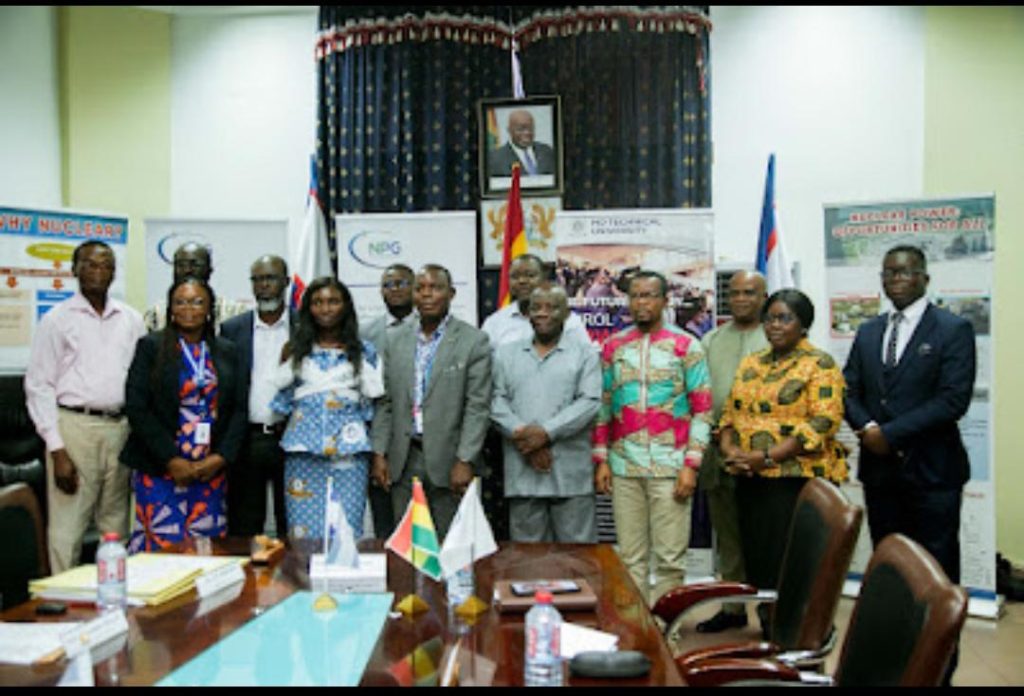By Samuel Akumatey
Ho, Sept. 16, GNA – The Ho Technical University has signed a Memorandum of Understanding (MoU) with the Nuclear Power Ghana and Institute to train more students in nuclear power to improve the sector’s human resource base.
The MoU was signed in Ho with heads of all departments and faculties present, making the University the first to partner with Nuclear Power Ghana (NPG) for nuclear development.
Prof. B. J.B. Nyarko, the Board Chairman of the NPG, said President Nana Addo Dankwa Akufo-Addo’s recent declaration of the nation’s readiness for nuclear power gave impetus to the programme.
In August 2022, the President approved nuclear power to be added to the country’s electricity generation mix.
“It means we have the full backing of the Government to proceed with the nuclear power programme,” Prof. Nyarko said.
The NPG was established by the Ghana Atomic Energy Commission in 2018 as the first nuclear plant operator in the country.
However, the scope of nuclear power made its engineers and scientists the most difficult to train and commended the Ho Technical University (HTU) for emerging the most eager and receptive to the programme.
He said the HTU joined the School of Nuclear and Applied Sciences of the Nuclear Ghana Institute, established in 2006, in becoming the pioneers of a consortium of universities formed to generate the needed resources for the programme.
Prof. Nyarko said the MoU would help provide the needed competency of staff for the programme, which was among its major needs.
The project would broaden the scope of nuclear education and include education on safety and security.
Dr Stephen Yamoah, the Executive Director of the NPG, said the organisation would provide the needed support to ensure that the HTU became the hub of competent human resources to develop the nation’s nuclear capabilities.
Currently, the operators were on phase two of the Nuclear Power Programme and envisaged that by 2030 Ghana’s first Nuclear Power Plant would be operational, he said.
According to the International Atomic Energy Agency, some specialists in the nuclear field require 5-10 years of training and experience, which meant that building and maintaining human capacity was a critical component of Ghana’s Nuclear Power Project.

“Here at Ho Technical University, you are known as one of the best technical institutions in Ghana for providing education and training in technical and vocational fields,” Dr Yamoah said.
“Our engagement with Management was positive and we encourage Management to envision a bigger picture and identify its role in assisting the Government to develop the nation through nuclear science and technology.”
“We want to assure the HTU that all necessary technical and human support would be provided.”
Prof Seth Debrah, the Director, Nuclear Power Institute, said a foundational course for all in the university environment had become necessary as “anybody close by the facility should be made aware of what is going on.”
The human element was especially important, who needed a certain level of competence and capacity to propel the nation into achieving its objective.
He pledged the readiness of the Institute to train the students into competent professionals and “turn the place into the fulcrum where technical ability is built.”
Prof. Ben Honyenuga, the Vice Chancellor of the University, said it would position the university to take advantage of the programme, and expressed commitment to the cause.
The University, he said, was ready to roll out technician, bachelor, and doctorate level competency-based programmes in nuclear sciences, which aligned with the University’s technical education mandate, adding; “We are ready and willing to begin now.”
The Vice-Chancellor lauded all stakeholders, including the legal teams, for making the MoU more suitable, and charged the Director for Technical and Vocational Education and Training to lead the implementation of the nuclear foundational course.
GNA